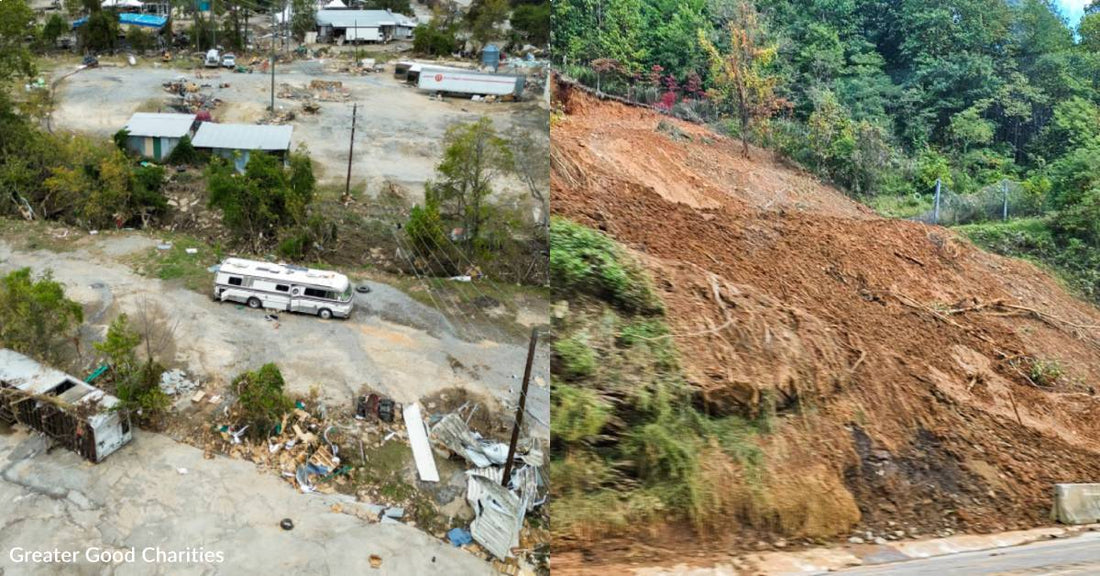New Estimates Show Hurricane Helene Caused $53 Billion in Damages in North Carolina
Michelle Milliken
It’s been just over a month since Hurricane Helene made landfall in Florida and then continued a devastating track throughout the Southeast. North Carolina was the hardest hit, with nearly 100 deaths, along with widespread destruction in the western portion of the state. We’re finally getting some preliminary damage figures, and they’re staggering.
According to Governor Roy Cooper’s office, initial estimates show Helene caused $53 billion dollars in damages throughout North Carolina, making it the worst storm the state has seen and three times as destructive as 2018’s Hurricane Florence.

Governor Cooper said, “Helene is the deadliest and most damaging storm ever to hit North Carolina. This storm left a trail of destruction in our beautiful mountains that we will not soon forget, but I know the people of Western North Carolina are determined to build back better than ever. These initial funds are a good start, but the staggering amount of damage shows we are very much on the front end of this recovery effort.”

As part of a news release proposing $3.9 billion dollars in state funding for Helene relief and recovery, the governor’s office highlighted the storm’s “economic devastation”, along with damages to housing, water and sewer systems, power generation facilities, and 5,000 miles of state-maintained roads.
This came as the state was inundated by rainfall that peaked at more than 30 inches in portions of Yancey County. Over three days, substantial rainfall throughout western North Carolina caused the Watauga, Catawba, Swannanoa, and French Broad rivers to approach or exceed their major flood stages.

Further south in Florida, where the storm first made its presence known, storm surge of up to 15 feet occurred along the Gulf Coast, inundating coastal communities with sea water. Communities in neighboring states were also impacted by the heavy winds and rains. Hurricane Milton complicated recovery work in Florida, as well, hitting within two weeks of Helene.

With your help, we’re still working with our partner Greater Good Charities to support the thousands of people who continue to be impacted by the devastation. We’ve distributed more than $7.8 million dollars in aid to over 50 hard-hit communities. There have also been 130 truckloads of essential supplies dropped off at sites across the Southeast.
Aid has included the transportation of shelter pets from swamped Southeastern shelters to places with more room for them, which started off with 125 cats and dogs being flown from South Carolina to Wisconsin. Animal shelters have also received food, rapid tests for pet diseases, and supplies like cat litter to help address their needs while they deal with an influx of pets and work out the repairs needed after such devastating flooding.

Another hard-hit group in need of assistance are pollinators, which put about a third of the crops we eat on our plates each day. We’ve been working with Mann Lake Bee & Ag Supply to help beekeepers whose hives were destroyed by Hurricanes Helene and Milton and who urgently need food to sustain their remaining bees, as the storms wiped out much of the crops and flowers they’d depend upon.
On that front, there was a recent distribution of 41,000 gallons of syrup and 40,000 pounds of bee pollen substitute to beekeepers in Winter Haven, Florida.

We’ve also been helping wildlife sanctuaries who have sustained damage and have more animals in their care than usual, some suffering from the health impacts of red tide. Hygiene kits, diapers, cleaning supplies, and other essentials have made their way to people in need, as well, including through a flight on which we partnered with Southwest Airlines.
As federal and state aid continue to be worked out to address urgent needs, you’ve been helping us provide aid. If you’d like to keep lending us a hand, click here!

